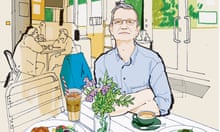This was my first job as a librarian. There were three mobile libraries in Powys, and I was responsible for the one in Radnorshire. Powys is a huge but sparsely populated county. I’d head off into the wilderness every day to visit tiny farmhouses in the middle of nowhere. You’d do about 50 miles a day, a different route each day, on a fortnightly rota.
The service was used mostly by elderly people, who might not have seen anyone else for a week or two, so there was a big social aspect to it. You’d have a cup of tea, and they’d give you presents: eggs, vegetables, flowers, a pound at Christmas.
There was one lady whom I never saw; her house was at the end of a long dirt track, so her daughter used to drop the books off in a plastic bag in the hedge on her way to work. Like a lot of ladies, she wanted anything from Mills & Boon. People could take out up to 20 books at each visit, and they’d pile them up in their arms so they could barely see over the top. There was fierce competition for new titles, and they’d make secret marks – squiggles, or an initial or a number – in the backs of the ones they’d read, to remind them. So I knew to check which ones this woman hadn’t read before I left her new ones. Go into any library today, and you’ll still find those squiggles.
The van was pretty big, and I’d only just passed my driving test, so it was pretty terrifying going down all those country lanes. Powys is fairly mountainous, with lots of snow and ice in winter, and you had to know where you couldn’t turn and where you’d have to reverse; there were no mobile phones, so if you got stuck, you just had to wait for help.
One day, my boss said, “Someone’s coming out with you on the mobile.” The Library Association had got in touch with Martin Parr to see if he’d be interested in spending a day with us as part of National Libraries Week. He wasn’t as famous as he is now, but I knew of him from a brilliant 1992 BBC documentary, Signs Of The Times, an early reality show that looked at people’s tastes at home; Martin was the stills photographer, and published a book based on it.
On the day Martin came, we had to stop in the middle of the moors for a huge flock of sheep to pass. It was incredible, having all that amazing countryside to explore. You’d stop in a lay-by for lunch, look out across beautiful mountains, and it would just be you for miles, eating your sandwiches with the birds and squirrels.
I’m the librarian at Hereford College of Arts now. The mobile library service is still hanging on in Powys, but I don’t know how much longer it will survive. Even then, it felt like part of a disappearing world.









Comments (…)
Sign in or create your Guardian account to join the discussion